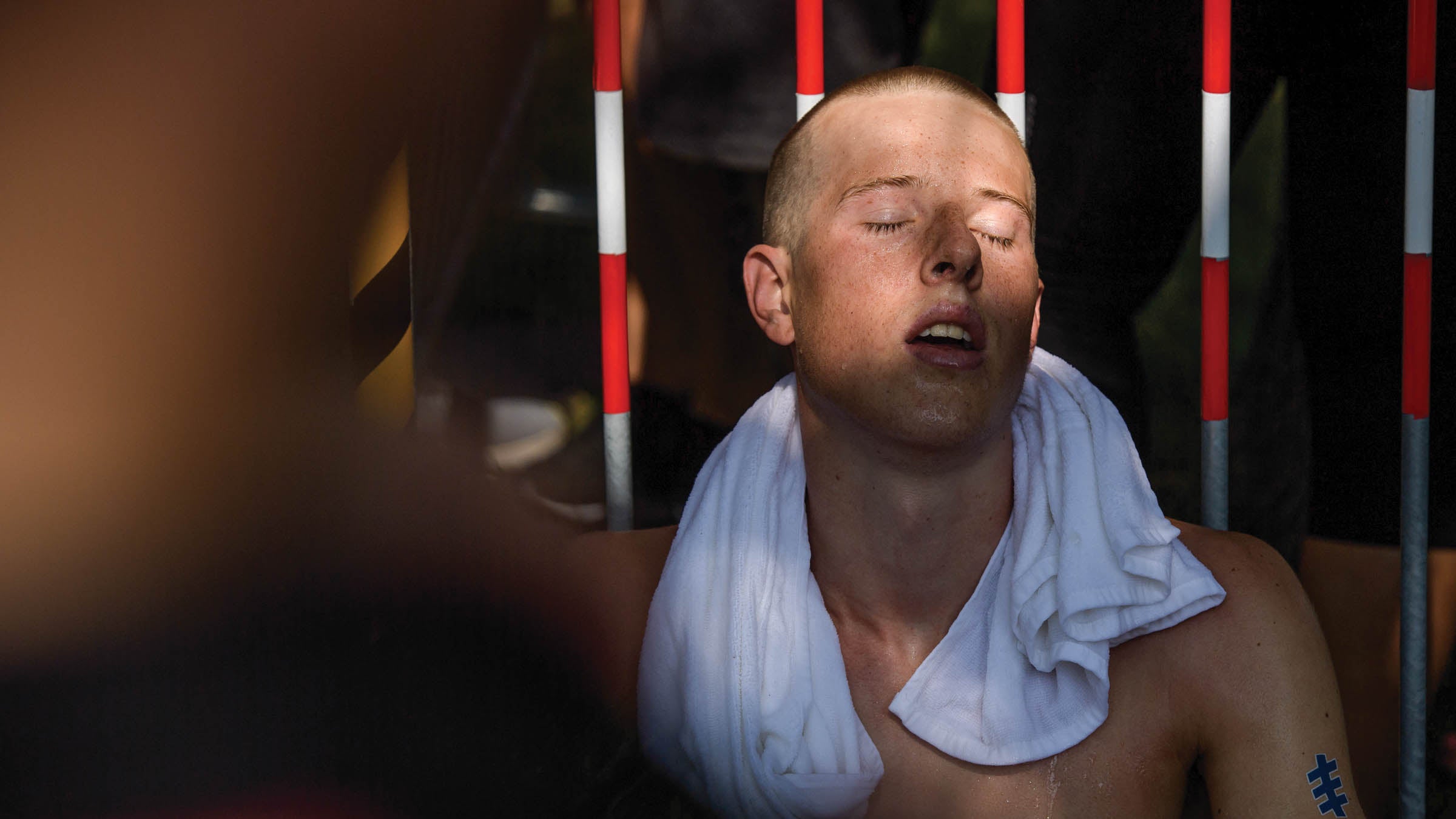How Much Training Is Too Much Training?

(Photo: Jörg Schüler/Getty Images)
Table of Contents
Here’s the frustrating thing about endurance sports: The fastest way to a PR? Hard training. The fastest way to miss that PR? Too much hard training.
Stress plus rest is the way we build fitness. The term scientists use for this is “functional overreaching.” But with a bit too much ambition, functional overreaching can quickly become dysfunctional. “When you’re exercising, you’re putting stress on your skeletal muscle, your cardiovascular system, and even the nervous system,” said David Ferguson, Ph.D., an assistant professor at Michigan State University’s department of kinesiology, whose research centers on physiological stress. That stress results in small amounts of damage to your cells. Your body then works to repair that damage—making your legs and heart just a bit stronger in the process.
If, however, week after week you stop your body from repairing the damage of each day’s efforts, you essentially put yourself into a state of chronic inflammation, Dr. Ferguson said. That inflammation can reduce mitochondrial adenosine triphosphate (ATP) production, according to a 2013 paper published in the Journal of Sport and Human Performance. As you may (or may not) remember from high school biology, mitochondria are the “powerhouses” of human cells, responsible for the production of ATP, which is the chemical energy our cells use for things like muscle contraction. Normally, when you deplete your ATP, the body begins making more. But when you’re overtrained, “you block that mechanism,” Dr. Ferguson said. Which is why your legs constantly feel like lead.
RELATED: Every Triathlete Needs to Understand Good Pain vs. Bad Pain
We don’t know exactly how many endurance athletes struggle with overtraining syndrome (OTS) each year, but a paper published in Sports Health: A Multidisciplinary Approach estimated that 60% of elite athletes and 33% of recreational athletes grapple with OTS during their lifetimes. That’s a significant number of athletes sidelined because of a preventable problem, and it suggests even the regular recreational athlete risks going past their ability to build stress and recover if they ramp too much too quickly. Plus, once you’re sidelined, recovery from true overtraining syndrome takes time. Like: Wipe out a big chunk of your race season time, said Todd Buckingham, Ph.D., an exercise physiologist at the Mary Free Bed Sports Performance Lab in Wyoming, Michigan, and multi-time age-group national champion. “It can be months before someone gets back to feeling good,” he said.
While we often think of overtraining as being a strictly physical problem solely in the domain of elite athletes, it’s not. Here’s how overtraining can impact our bodies and our minds, and what we can do to avoid it.

Are Your Injuries Caused by Overtraining?
Soreness is just a regular part of triathlon life. Delayed-onset muscle soreness (DOMS) after a hard run or race is expected. But if you always feel a little sore or tired? That’s worth noting. How long it takes a body to move from “just a little tired today” to “truly overtrained” depends on your level of fitness, Dr. Ferguson said. A new athlete can end up with overtraining syndrome after just four to six weeks of hard work. An elite athlete may take two to three months to suffer the same fate.
Nutrition can also play a role in an athlete’s susceptibility to OTS, Dr. Ferguson said. Not consuming enough calories hampers your body’s recovery efforts. A 2021 paper published in Sports Medicine analyzed studies on training overload that tracked diet and energy availability. A majority of the studies showed an energy imbalance among the athletes who were overtrained. The study authors posited that OTS and Relative Energy Deficiency in Sport (RED-S) are closely related. However, you can be overtrained and not necessarily dealing with disordered eating, according to Dr. Buckingham. RED-S and OTS are not the same, but if you’re constantly finding yourself overstretched, looking at your relationship with food might be a wise move.
While OTS has a variety of symptoms that can vary from person to person, the most significant, universal sign is a chronic drop in performance, Dr. Buckingham said. If you’re burned out but still posting great times, you’re not overtrained, he said. But if you ignore the signs and keep on pushing? That’s when things get ugly. If you refuse to rest, you’re often headed for an overuse injury too, like a stress fracture.
This Is Your Brain on Overtraining
“Stress is stress,” Dr. Ferguson said, explaining that your body can’t necessarily differentiate between the stress of a hard workout and the stress of moving to a new home or going through a divorce. It all triggers the release of stress hormones like epinephrine and cortisol. Epinephrine—also called adrenaline—can mess with your ability to sleep, which is why so many overtrained athletes feel sluggish all day but can’t get any rest at night.
Numerous studies—on athletes like rowers, gymnasts, and football players—have found a link between overtrained athletes and symptoms of depression. While these studies generally can only show correlation, there are a few hypotheses for why overtraining syndrome may result in depressed mood. One hypothesis argues that systemic, chronic inflammation utilizes the tryptophan present in your blood to synthesize C-reactive protein and other inflammatory-related proteins. And low levels of plasma tryptophan have been linked to depression in non-athletes.
Overtraining may even affect your ability to make decisions. A 2019 study published in Current Biology took two groups of triathletes and had one ramp up their training by 40%. A few weeks later, those athletes were showing symptoms of overtraining syndrome. The researchers put both groups of athletes in a brain scanner and asked them questions such as, “Would you like $10 now or $60 in six months?” The overtrained group wanted the money now. Interestingly, Bastian Blain, PhD, the lead author on the study, said that the overtrained athletes did well on other tests. “They became more impulsive for economic choices,” he said, “but they remained equally good in tasks involving working memory or tasks for which there is an objective correct answer.” In other words, it wasn’t so much that our brains were tired, as they were impulsive. The takeaway here? Don’t make any big life decisions when you’ve been feeling overtrained and be aware that if you notice you’re making impulsive choices or decisions and you’ve been overdoing it in training then it could be a telltale sign worth noting.
RELATED: Mental Health Resources for Triathletes

Overtraining Pitfalls and Remedies
Being overtrained is a common issue for triathletes, but what should you look out for? Below are some of the most common warning signs and pitfalls that can occur while you try to bounce back. Do any of these sound familiar? Check for the expert solution to each symptom, so you can turn that ship around before it sinks. Print out these handy tips and stick them in your bag or pin them next to your training calendar to help you remember what to do and when.
Problem: Training Is an Exercise in Frustration
For pro ultrarunner Corrine Malcolm, training literally had turned into her job. It was 2012 and she’d left college to pursue a spot on the U.S. Olympic Biathlon Team. Living at the Olympic Training Center in Lake Placid, New York, her sole focus every day was getting faster. The volume was high and so was the pressure. But her times were getting worse, not better. By the time the second half of the Olympic Trials rolled around, Malcolm knew she was not going to be able to race. “I just knew that I needed to totally step away,” she said, adding that she ultimately left the sport entirely.
Solution: Make It Fun
Malcolm would end up taking 18 months completely off from competitive sports. In those 18 months, she lived by a new rule: Any exercise had to be social. If a friend was going for a jog around town or a bike ride to get ice cream, she’d join. Focusing on enjoyment—not splits or mileage—let Malcolm keep moving while still getting the rest she needed. Even if you don’t take that much time, be sure to keep your rest/downtime somewhat “playful.”
Problem: Packed Days, Short Nights
At the Olympic Training Center, Malcolm felt like she was living in a fish bowl. Getting enough rest was a challenge in that intense living situation. These days, Malcolm coaches for Carmichael Training Systems and sees many of her age-group athletes struggling to get enough sleep, too. Most of these athletes are working full-time jobs and managing families in addition to logging big miles. Something, somewhere has to give, and way too often it’s adequate shut-eye.
Solution: More Rest
You may need to do a life audit and look at what you can and can’t control stress-wise, Malcolm said. Maybe we can’t control everything about our boss’ demands, but we can control how we engage with stressful people and situations. And most of us can control how much sleep we get, so commit to an early bedtime. But don’t just hit the sack at 9 p.m. Few people fall asleep the moment they close their eyes. If you want to get eight hours of rest, be in bed at least 15 minutes before you want to be asleep, she advised.
Problem: Rest Feels Like Stress
When pro triathlete Frankie Sanjana was recovering from overtraining syndrome, she found that suddenly her life lacked structure. A pro athlete’s day centers on training—so what do you do when you don’t have that? Plus, many of her social connections were training buddies. “Time away from sport is often very isolating,” she said.
Solution: Get Another Hobby
Distract yourself by diving into something new that you’ve always wanted to tackle. Sanjana loves learning new languages. So when she needs to back off the mileage, she looks at it as an opportunity to spend more time doing that other thing she loves.
Problem: Depressed Mood
Malcolm was tired all the time and feeling glum about how poorly her workouts were going. “I thought I was depressed,” she said, adding that she sought the help of a sports psychologist. And of course: Missing your Olympic dream would depress most of us—but the ongoing feelings were also a result of overtraining. Luckily, the sports psychologist was able to give Malcolm the tools she needed to get through this rough time.
Solution: Practice Gratitude
Overtraining syndrome can cause feelings of depression, and if you’re not sure whether you’re overtrained or dealing with clinical depression, a good first stop is your primary care doctor. In Malcolm’s case, the cause truly was overtraining. Her psychologist suggested she try gratitude journaling. In the months after she waved goodbye to her Olympic dreams, spending a few minutes reflecting on the good things in her life became an invaluable habit. Try to write down three things you’re grateful for, or three good things that happen to you each day. You’ll be surprised by how much you still have to be grateful for, even if “set 5K PR” isn’t on that list.
Problem: Cutting Back on Food
The temptation to scrimp on calories once you’re not training much (or really, at all) may creep into your mind. “When an athlete suddenly can’t control their training because they are being forced to take time off, it’s not surprising that they would turn to calorie restriction for control,” Malcolm said. She didn’t personally struggle with this during her 18-month break, but she does see it sometimes in athletes she coaches. Be warned: Restricting calories when your body is trying to repair damage does more harm than good.
Solution: Nourish Your Body
Dr. Ferguson said we don’t yet have research showing good nutrition alone can save someone from overtraining syndrome, but eating well certainly will not hamper your recovery. While many athletes may feel a temptation to restrict their caloric intake as they recover from overtraining, since they won’t be training, resist this urge. Instead, use your extra would-be training time to make meals full of healthy fats, veggies, and plenty of carbohydrates, too.